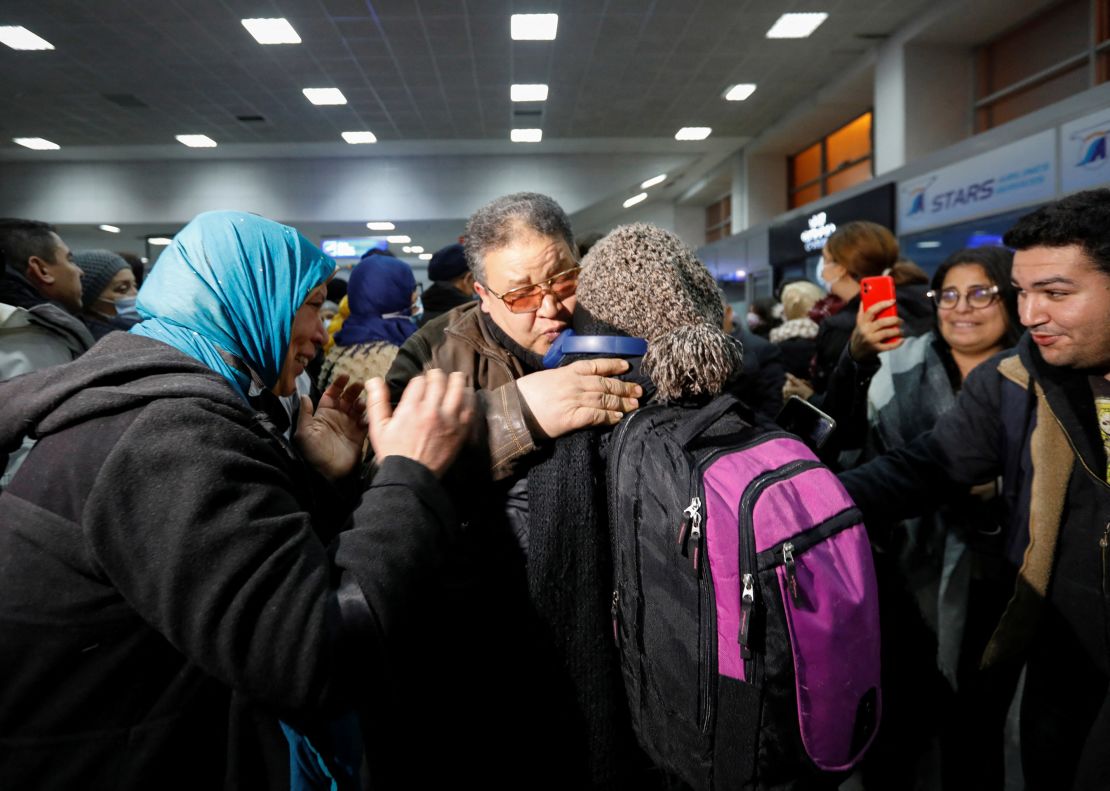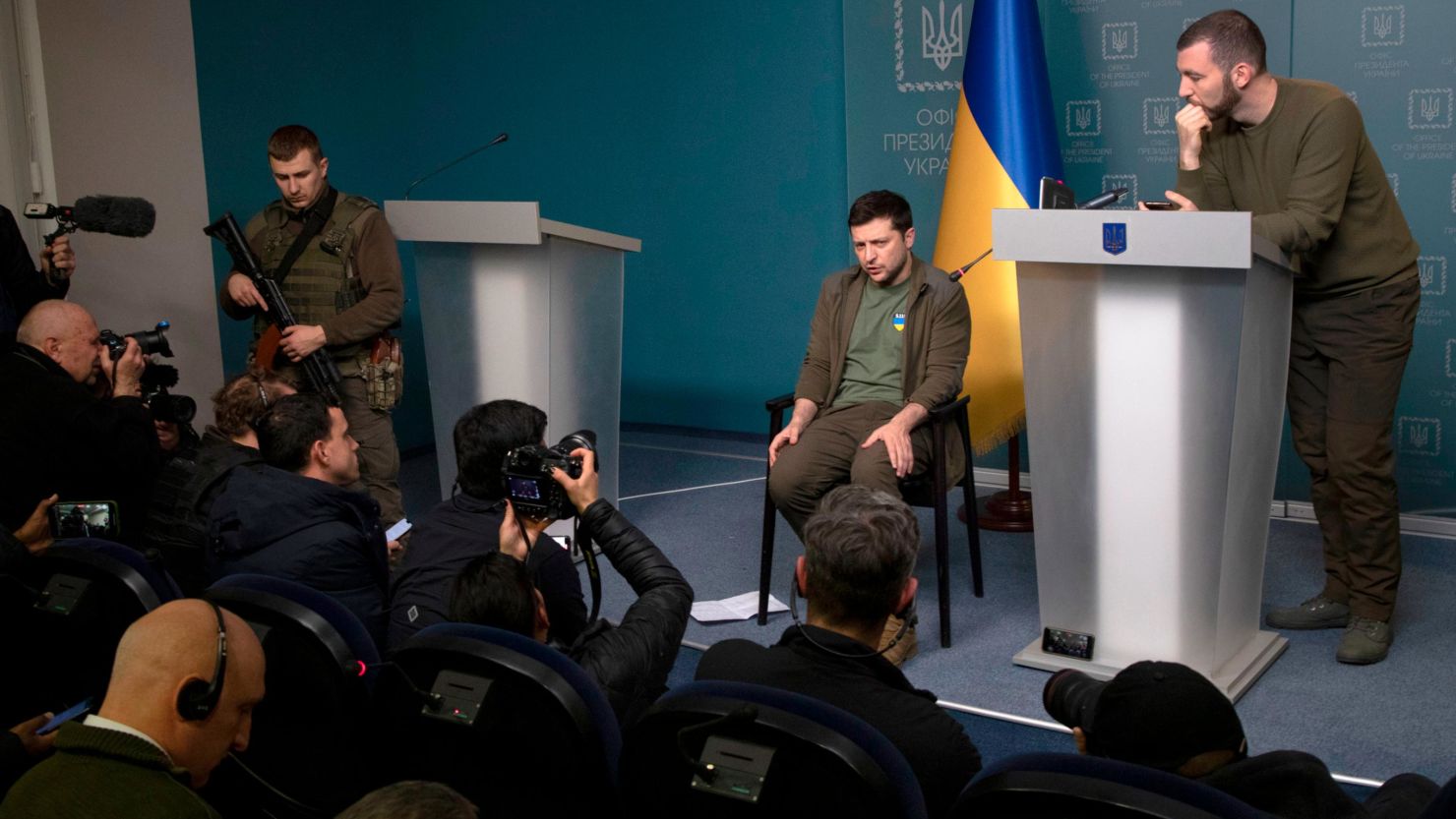The Middle East found itself dragged into coverage of the conflict in Ukraine over the past week as journalists descended on the country to cover the biggest European war in decades.
Western war reporters, more used to being deployed in Middle East conflict zones, were quick to make comparisons. Some of those comparisons went overboard, causing outrage in the Arab world.
“This isn’t a place, with all due respect, you know, like Iraq or Afghanistan that has seen conflict raging for decades,” said CBS News foreign correspondent Charlie D’Agata, referring to Ukraine. “You know, this is a relatively civilized, relatively European… city.” He later apologized.
Other news outlets poured sympathy on Ukrainian victims, with interviewees and correspondents pointing out that, unlike Middle Eastern refugees, Ukrainian victims were “white,” “Christian,” “middle class,” “blonde” and “blue eyed.”
In a matter of days, hashtags, and even t-shirts, featuring the phrase “civilized” surfaced in the Middle East in protest.
The media coverage prompted the New York-based Arab and Middle Eastern Journalists Association to issue a statement condemning the “pervasive mentality in Western journalism of normalizing tragedy” in places like the Middle East.
Its president Hoda Osman, who has reported for several Western media outlets, including France24, ABC News and CBS News, said the contrast between coverage of Western victims versus Middle Eastern ones demonstrates a dehumanization of the latter.
We asked her why she feels this is happening and what can be done about it.
Western news outlets have many more minority journalists than they used to. Has that diversity trickled down to coverage?
There’s no doubt that having more minority journalists would lead to better coverage, whether it’s through catching misinformation, bias and racism, booking interviews with knowledgeable people who understand the nuances, offering background and context or helping with something as simple as correct translations and pronunciations.
Over the past 16 years, we’ve seen the number of journalists of Arab and Middle Eastern descent working in the Western media grow significantly. There’s also more diversity in the type of media outlets [Middle Easterners] are a part of, from local TV stations and newspapers to occupying senior positions at national and international news outlets. But we still need more. Simply being in the room makes a difference and results in improved reporting.
Is the level of bias that you see in the Western press unprecedented? What’s the difference this time?
What is sad this time is that the [offending] comments came so casually, spontaneously, and as a result, revealed existing bias, something we would expect a journalist covering an international event to be above.
Sadly, we were not shocked. The remarks got some attention thanks to social media, but we knew this kind of bias and racism exists.
How seriously do you think news outlets are taking these claims of bias?
I think public pressure will have some impact. I also expect that many organizations truly want to do the right thing.
We have called on newsrooms to train correspondents on the cultural and political nuances of regions they’re reporting on, and not rely on American- or Euro-centric biases.
Do you think now that Western journalists have covered a European war they will be more sympathetic to victims of Middle Eastern wars?
To be honest, I don’t think it even matters whether or not they do. We are just asking journalists to be journalists and do a good job of reporting without inserting their own biases into the story and making unnecessary comparisons.
The transcript has been edited for length and clarity
Other top Middle East news
Saudi Arabia ready to mediate between all parties on Russia-Ukraine
Saudi Crown Prince Mohammed bin Salman received a phone from Russian President Vladimir Putin on Thursday and offered to mediate talks between Moscow and Kyiv.
- Background: The prince also spoke to Ukrainian President Volodymyr Zelensky and told him the kingdom supports de-escalation in Ukraine. Israel and Turkey have also offered to mediate.
- Why it matters: The offer from Saudi Arabia comes as the Gulf nation tries to balance ties with the US and Russia, with which it coordinates its oil policy. After taking an effective neutral stance, Saudi Arabia condemned Russia’s invasion of Ukraine this week at the United Nations.
Iran says it can reach top oil output two months after nuclear deal
If a nuclear deal is reached, Iran will be able to ramp up its oil production to max capacity in less than two months, Oil Minister Javad Owji was quoted as saying on Thursday.
- Background: Iran sits on the world’s fourth-largest oil reserves, but its crude output has dropped since the imposition of US sanctions on its economy in 2018. A US State Department spokesperson said Thursday that a deal was close but cautioned that unsolved issues remained.
- Why it matters: Brent on Thursday climbed towards $120 a barrel, its highest in almost a decade amid war in Ukraine. An increased supply from Iran could help ease the rally. Tehran pumped 2.4 million barrels per day on average in 2021 and plans to increase output to 3.8 million barrels per day if sanctions are lifted.
Up to 20,000 Ukrainian tourists stuck in Egypt, awaiting return to Europe
As many as 20,000 Ukrainian tourists are stranded in Egypt as the Ukrainian embassy in Cairo arranges to fly them to Europe. They are mainly residing by the Red Sea resorts, said Ukrainian diplomat Yevhen Zhupeyev in a news conference in Cairo.
- Background: Russia launched a large-scale invasion of Ukraine on February 24, an attack that was denounced by Western leaders and their global allies. In a UN General Assembly session on Wednesday, most members voted in favor of a resolution that condemned Russia and called for its immediate withdrawal from Ukraine.
- Why it matters: Despite having close relations with Moscow, Egypt was among countries that voted in favor of a UN resolution on Wednesday condemning Russia’s invasion. Egypt is allowing Ukrainian tourists to remain in Egypt until European countries are ready to receive them.
Around the region
Human intervention has led to the number of Arabian leopards in Saudi Arabia to dwindle to less than 200. The kingdom is now trying to change that.
Saudi Arabia last month launched an awareness campaign to shed light on the critically endangered feline, as authorities work with conservationists to safeguard the remaining leopards.
The smallest member of the leopard family, Arabian leopards arrived in the northern Arabian mountains almost 500,000 years ago, the Royal Commission for AlUla (RCU) says on its website.
The Saudi city of AlUla is one of the oldest cities in the Arabian Peninsula and has become a hub for the kingdom’s heritage.
Humans are the main cause driving the animals towards extinction, said the commission.
“The expanded human presence has reduced and fragmented the Arabian leopards’ habitat,” the RCU wrote in an awareness brochure, adding that conflict between communities raising livestock in the area and the leopards’ attempts to prey on the herders’ animals lead to humans either attacking or even hunting the leopards.
In an effort to boost awareness, Saudi Arabia marked its first ‘Arabian Leopard Day’ on February 10, where it lit up landmarks with photos of the endangered cats with the hashtag #ArabianLeopardDay. In 2019, it launched a global fund to finance conservation projects, and last September saw the birth of a rare female cub in a captive-breeding program in the city of Taif.
Arabian leopards emerged from Africa and hold symbolism for the peninsula’s population. The commission says there may be less than 50 adult leopards left in the country. There are also few remaining in Oman and Yemen, with the last sighting in Saudi Arabia dating as far back as 2014.
Conservation projects have also been underway in Oman since 2014, where a leopard community has taken refuge in the mountains of Jabal Samhan Nature Reserve.
In Yemen, dire conditions resulting from ongoing war have led to neglect, with posts on social media showing the wild cats either dead or captured.
Photo of the day





